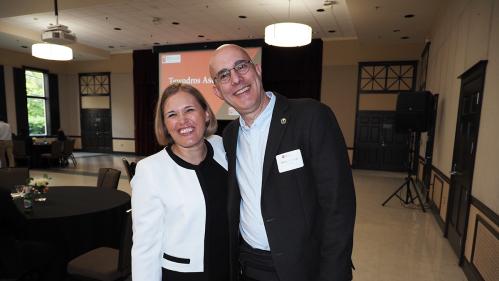Rutgers Office for Research Hosts Patent Awards Celebration

The Rutgers research and innovation community came together to celebrate its own at the 2023 Patent Awards Celebration, in Trayes Hall at the Douglass Student Center.
The event, hosted by the Rutgers Office for Research, honored and recognized 171 Rutgers researchers who were issued a total of 315 U.S. Patents between fiscal years 2020-2022 (July 1, 2019 – June 30, 2022). Due to the COVID-19 pandemic, this was the first such event held in three years.
Rutgers researchers who received patents were awarded plaques to honor their accomplishments and were welcomed and congratulated by both Senior Vice President for Research Michael E. Zwick and Acting Executive Director of Innovation Ventures (now Technology Transfer) Deborah Perez Fernandez.
“In accordance with Rutgers’ role as a premier research institution in the state and in the country, the mission of the Office for Rutgers is to support the research, scholarship, and creative endeavors of ALL Rutgers faculty,” said Zwick. “As I meet with state officials discussing topics like the impact of Rutgers research on the New Jersey economy, or why fringe relief is so important, and get asked about the Rutgers value proposition of more support, it’s easy to come up with at least a dozen examples of the great work that is the result of the collaboration between the amazing Rutgers researchers and incredible Office for Research team. We are thrilled to once again host this event to celebrate these achievements, and we look forward to doing so each year.”
Over the past three years, there were a total of 512 invention disclosures made to Innovation Ventures (now Technology Transfer), 515 U.S. Patents filed by the team, and 192 U.S. Patents issued. In all, the collaboration between researchers and Innovation Ventures (now Technology Transfer) led to $68 million in licensing revenue, 1,329 new agreements signed, 526 technologies licensed, 231 licenses and options, and 19 new startups formed. Currently, the Office for Research is managing 1,320 active technologies, 40% of which are licensed.
“Our team collaborates with Rutgers researchers daily, and the event and data highlight the success of that collaboration,” said Perez Fernandez, whose team handles the technology commercialization efforts of the university. “Rutgers innovators and the Office for Research team that supports them represent two important sides of the Rutgers innovation ecosystem, working together to translate the important research conducted here at the university to improving the lives of people everywhere. We look forward to continuing that partnership next year and beyond.”
Click here for the list of Patent Awards Celebration Honorees
What They're Saying
-
Distinguished Professor and Chair, Susan Lehman Cullman Laboratory for Cancer Research, Department of Chemical Biology, Ernest Mario School of Pharmacy, Rutgers Biomedical and Health Sciences
“Protecting Rutgers researchers' intellectual property shows the importance of one’s research and recognizes one’s discovery. The Office of Research has been instrumental in providing guidance and identifying potential patents, while navigating the process from filing provisional claims to receiving a patent. This event shows the individual researchers the acknowledgement and appreciation from their peers and is a celebration for the advancement of sciences.”
-
Henry Rutgers Chair, Associate Professor, Department of Chemistry and Center of Computational and Integrative Biology, Rutgers-Camden
“Innovation is the key to sustainable growth. New, clever, thoughtful ideas are what improve the human condition. Innovation should be celebrated, rewarded, and supported. The work the Office for Research and Innovation Ventures does to support researchers is important to a) imagine a non-obvious solution; b) have the expert knowledge to design it; and c) possess the fortitude to reduce it to practice, which requires a rare and valuable set of features. If the researcher has exhibited this set of features once, chances are they will exhibit them again. If they are not rewarded for the discovery or if they are not protected, they may stop innovating. Protecting researchers’ intellectual property, therefore, not only supports continued innovation but it demonstrates to the researcher that they are valued. Thus, despite appearances, intellectual property protections have a human element; it gives the innovators the confidence to work without fear of loss. On a practical level, Innovation Ventures managed the patent applications and supported the licensing agreement for our software. Notably, however, the Office of Research is more than an office that aids in the administrative aspects of research translation; they have become an integral member of our team and have shown us just how valuable our work is. For that I thank them.”
-
Professor, Department of Chemistry, School of Arts and Sciences, Rutgers-Newark
“When I think about the Office for Research, one word comes to mind: appreciation. I really appreciate all the help from the Office for Research for our endeavors. As a scientist, the most common strategy to disseminate our research discoveries is by publications in scientific journals. We are more familiar with writing a manuscript for that purpose. The Office for Research made me understand for the first time what is patentable, which can be so different from what is publishable. I also appreciate so much that the vision of the research is greatly broadened at the stage of converting a manuscript for journal publication to a patent. Last but not least, I appreciate the tremendous efforts the Office for Research makes in helping us to find organizations who might be interested in our technologies, organizing the discussions with potential licensing companies. The discussions with the Office for Research further pushes us to think of the research to ways that are sometimes or commonly overlooked.”
-
Professor Emeritus, Medicinal Chemistry, Ernest Mario School of Pharmacy, Rutgers Biomedical and Health Sciences
“I realized the critical importance of filing patents on intellectual property early in my career at Rutgers. I approached a major pharmaceutical company about possible collaboration in the assessment of a new breast cancer drug that our laboratory had discovered. I was asked if I had patented our research findings prior to publication. When I said no, he replied: “Congratulations, you just destroyed any possibility of getting these potential novel new drug entities developed into the clinic.” That is pretty much how the conversation that originated with my request for collaboration ended. A valuable lesson was learned that day. Since then, I have had the good fortune to have been supported by several pharmaceutical companies over the years based solely upon my patent portfolio at Rutgers. These include support from Johnson & Johnson, AVAX Technologies, Celgene, Genzyme and Taxis Pharmaceuticals. This support provided stipends for graduate research assistants, funds for laboratory supplies and the ability to purchase equipment. This was clearly of great benefit to our research efforts over the years.”
-
Professor, Department of Computer Science, Rutgers-Camden; Professor, Department of Plant Biology, Rutgers-New Brunswick
“Patents play a crucial role in technology transfer. As academics, we tend to focus more on technology development and less on other parts of the technology transfer process, which are also important for new technology to have an impact. The award celebration helps us to be aware of and celebrate the patents that have been awarded to Rutgers University faculty—and consequently the technologies that are on the way to real-world impact. There are many reasons why the protection of researchers’ intellectual property, including those technologies, is important, from encouraging innovation, recognizing and rewarding researchers for their hard work, attracting investment, to protecting their rights. For my work with Catherine Grgicak on forensic DNA genotyping, we wanted to control how our technology is used and how it would be translated into practice. Patenting our technology has helped us to do that. The Office for Research was instrumental in the licensing of forensic DNA genotyping technology Dr. Grgicak and I developed with BU and MIT to SoftGenetics. Innovation Ventures liaised with the licensee, negotiated the terms of the licensing agreement, and handled the legal contracts. We could not have licensed our technology to SoftGenetics without the Office for Research and Innovation Ventures.”
-
Distinguished Professor, Materials Science and Engineering, School of Engineering, Rutgers-New Brunswick
“This event is a nice way to congratulate Innovation Ventures and the faculty for their joint efforts in securing patent rights and licensing agreements. Protecting researchers' intellectual property creates value for the industrial community as it affords the privilege of using the technology while excluding competitors from using the tech. The Office for Research’s Innovation Ventures team has supported my work by securing research funding, licensing technologies, and filing patents.”
-
Distinguished Professor of Plant Biology; Director of New Use Agriculture and Natural Plant Products Program (NUANPP); Director of Center for Agricultural Food Ecosystems (RUCAFE) and The New Jersey Institute of Food, Nutrition & Health; Co-Director of Center for Sensory Sciences and Innovation (CSSI); School of Environmental and Biological Sciences, Rutgers-New Brunswick
“To scientists, the protection of intellectual property is important for several reasons. First, it often permits and justifies the private sector to invest in the commercialization of a discovery that can be useful to society, whether it’s a new medicine, food, healthcare device, and new technology. Without such protection, many companies would not invest and commercialize in the new technology/invention. The protection of such IP facilitates being discovered and shared as an idea and fosters commercialization and its utilization. Secondly, as scientists, we seek answers and solutions, and when we are fortunate to discover something so unique, innovative, and creative, it’s our intellectual artistry not unlike that of authors of books (fiction/nonfiction), musicians and composers, and artists. They too, seek to share their work but want to be recognized for their 'inventorship'. To that end, the Office for Research and Innovation Ventures team has simply been exceptional. The leadership, staff, and assistance in this office make it possible for me to pursue patents. I see them as my/our partners in the commercialization process. Having such a strong collaborative partner makes it more exciting and worthy to pursue new inventions. I don’t see this level of support at other universities, and I feel quite fortunate to have such close friends and colleagues at the Office for Research. This event is a celebration of discovery, intellectual contributions that the RU community provides to society, and a real hallmark of such a multidisciplinary and supportive community. This award ceremony, with the celebration and providing the plaques to the inventors, tells us that the Office for Research and the university truly care.”
-
Director of Biomaterial and Prosthodontic Laboratory; Assistant Professor, Department of Restorative Dentistry, Rutgers School of Dental Medicine, Rutgers-Newark
“Protecting researchers' intellectual property is crucial for several reasons. Intellectual property rights, such as patents, copyrights, and trademarks, incentivize innovation by granting researchers exclusive rights to their creations. This encourages researchers to invest time, effort, and resources into innovative research, knowing that they can benefit and gain a competitive advantage. Intellectual property protection also drives economic growth by promoting technological advancements, scientific breakthroughs, and creative works, leading to the development of new industries, job creation, and increased productivity. A Patent Award celebration serves as a platform to honor inventors, inspire others, foster collaboration, raise awareness, promote economic growth, and create a supportive ecosystem for innovation. By placing a spotlight on good patents—ones that have real-life applications and potential—it encourages inventors to prioritize practical inventions that can bring about positive change.”



